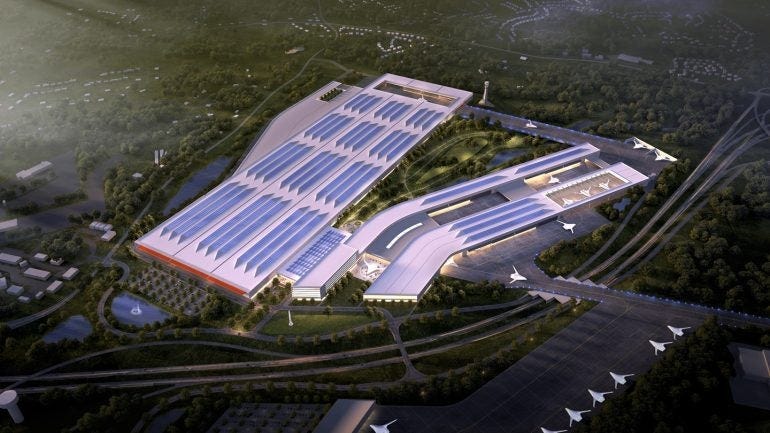#Sustainability20: JetZero to build $4.7bn AI-driven aircraft facility in North Carolina & more
Weekly Roundup - 20/06/25
Each Friday, we publish a round-up of the 20 most important stories on sustainable aviation. You can see previous editions of #Sustainability20 here.
Industry Updates
The US is expected to oppose a UN aviation fuel proposal favouring Brazilian corn ethanol, arguing it unfairly advantages Brazil’s multicropping practices. Critics warn politicising SAF standards could undermine global decarbonisation efforts.
Wizz Air has reduced emissions per passenger to 52.2g CO₂/km, among the industry’s lowest, but its total emissions have doubled since 2019 due to rapid fleet expansion under its growth strategy.
CLIMATE WATCH: Climate misinformation turning crisis into catastrophe, report says - The Guardian
A new report warns climate misinformation, amplified by fossil fuel interests and bots, is delaying action. Experts urge criminalising greenwashing and defossilising media to combat discrediting of renewable solutions.
Infrastructure and operational efficiencies
Birmingham Airport has installed a £10m solar farm with 12,000 panels, generating 20% of its power and cutting annual emissions by 1,000 tonnes. It aims for net zero by 2033.
JetZero plans a $4.7bn AI-driven factory in North Carolina to produce its fuel-efficient Z4 blended-wing aircraft by the 2030s. The project, backed by airlines, could create 14,500 jobs.
Sustainable Aviation Fuel (SAF)
The EU is subsidising over 200 million litres of SAF to bridge the cost gap with kerosene. The scheme uses carbon permit revenues to meet its 2% 2025 SAF mandate.
ATR has partnered with ATOBA Energy to improve SAF access for regional airlines, including via ‘book and claim’ models. The deal supports ATR’s goal of 100% SAF capability by 2030.
Amazon has agreed to buy 7,500 tonnes of Neste’s SAF for its US cargo flights, cutting emissions by 80%. The deal aligns with Amazon’s 2040 net-zero target.
SAF Zero, a joint venture between Haffner Energy and Luxaviation, aims to fast-track SAF production in Europe using waste-to-fuel technology. The partnership targets scaling projects ahead of EU mandates.
New technology: Electric and Hydrogen
Archer Aviation has raised $850m, bolstered by a US executive order accelerating eVTOL deployment. The funds will support Midnight air taxi development ahead of its planned LA Olympics 2028 debut.
Eve Air Mobility has signed a $250m deal with Brazil’s Revo for 50 eVTOLs, with deliveries from late 2027. The pact marks Eve’s shift from development to commercial implementation.
Horizon Aircraft has teamed up with MT-Propeller to enhance its hybrid eVTOL’s propulsion system, aiming for quieter, more efficient operations. The Cavorite X7 targets regional and emergency service markets.
UrbanV and Signature Aviation have formed a US vertiport joint venture, initially focusing on Florida, New York, California, and Texas. The deal aims to accelerate eVTOL infrastructure and regulatory alignment.
RTX will test a hybrid-electric Dash 8-100 in Moses Lake, partnering with AeroTec. The project, targeting 30% lower emissions, reflects growing industry efforts to decarbonise regional aviation.
Republic Airways has agreed to acquire Beta Technologies’ Alia CX300 electric aircraft for pilot training and route testing. The deal includes options for more units as commercial services develop.
Airbus and MTU Aero Engines have partnered to advance hydrogen fuel cell propulsion, targeting a three-stage development roadmap. The collaboration aims to mature technology for future zero-emission aircraft.
Blue Spirit Aero has demonstrated hydrogen refuelling for its Dragonfly aircraft at Le Mans Airport, a key step toward 2027 commercial rollout. The four-seater prototype features 12 fuel-cell-powered motors.
Intelligent Energy has secured £17m in UK funding to develop its 300kW hydrogen fuel cell system for aircraft. The project targets Part 23 certification by 2030 and regional jets by the 2030s.
ZeroAvia and Loganair have agreed to explore hydrogen-electric engines for Twin Otters and ATRs. The deal supports Scotland’s decarbonisation goals and ZeroAvia’s planned fuel cell manufacturing near Glasgow.
The Paris Air Show highlighted eVTOL progress, with Wisk betting on autonomy and Eve prioritising piloted models. Beta Technologies’ Alia CX300 flew, while scepticism persists over cost and certification timelines.
Otto Aviation unveiled its Phantom 3500 laminar-flow business jet, claiming 61% lower fuel burn and 90% fewer contrails. The aircraft, targeting 2030 entry, aims to slash aviation’s climate impact.







